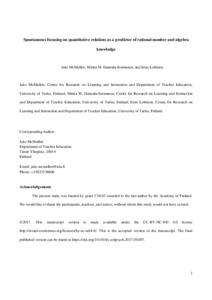Spontaneous focusing on quantitative relations as a predictor of rational number and algebra knowledge
McMullen Jake; Hannula-Sormunen Minna M.; Lehtinen Erno
https://urn.fi/URN:NBN:fi-fe2021042717082
Tiivistelmä
Spontaneous Focusing On quantitative Relations (SFOR) has been found to predict the development of rational number conceptual knowledge in primary students. Additionally, rational number knowledge has been shown to be related to later algebra knowledge. However, it is not yet clear: (a) the relative consistency of SFOR across multiple measurement points, (b) how SFOR tendency and rational number knowledge are inter-related across multiple time points, and (c) if SFOR tendency also predicts algebra knowledge. A sample of 140 third to fifth graders were followed over a four-year period and completed measures of SFOR tendency, rational number conceptual knowledge, and algebra knowledge. Results revealed that the SFOR was relatively consistent over a one-year period, suggesting that SFOR is not entirely context-dependent, but a more generalizable tendency. SFOR tendency was in a reciprocal relation with rational number conceptual knowledge, each being uniquely predictive of the other over a four-year period. Finally, SFOR tendency predicted algebra knowledge three-years later, even after taking into account non-verbal intelligence and rational number knowledge. The results of the present study provide further evidence that individual differences in SFOR tendency may have an important role in the development of mathematical knowledge, including rational numbers and algebra.
Kokoelmat
- Rinnakkaistallenteet [29335]
